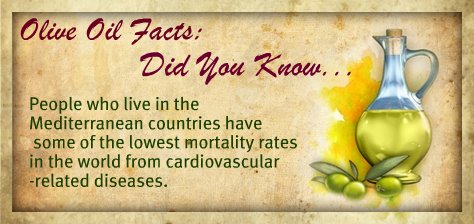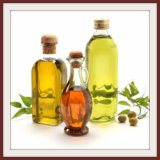What Are Olive Oil Ingredients?
Very often people ask: what are olive oil ingredients?
Olive oil obtained from pulp of olives. Nothing more, nothing less.
Let's learn about the key components in olive oil that makes it so healthy...
Olive oil is the key to the super-healthy Mediterranean Diet. It has amazing internal as well as external health benefits.
You can make home remedies, skincare remedies, use it for household cleaning. It has variety of uses. But exactly whats in the olive oil that makes it so healthy?
Nutritional Label
Im currently using a wonderful Greek extra-virgin oil and you can nutrition facts on the product label :
120 Calories per Tablespoon
14 grams of Total Fat:
1.5grams of Saturated fat
6 grams of Polyunsaturated fat
6 grams of Monounsaturated fat
0 Trans Fat
0 Sodium
0 Cholesterol and
0 Total Carbohydrate
Extra-virgin olive oil has only 120 calories per tablespoon and depending on which brand youre using they will have different grams of fat between polyunsaturated fat and monounsaturated fat. However, none will have any trans fat, sodium or cholesterol. Click here to learn more about different types of fats.
Secret Olive Oil Constituents
There are plenty of evidence from the medical community that links olive oil with lowering cholesterol and rate of heart disease as well as many types of cancer and so forth. But what is the secret?
Some of the key components in olive oil are:
- Essential Fatty Acids - Olive oil is made up of what are called Essential Fatty Acids (EFAs). Essential fatty acids are required to sustain and maintain good health but its the component that the human body cannot manufacture by itself. As such, they must be obtained through food.
Fatty acids come in two different varieties: saturated or unsaturated. Saturated fatty acids are what are in saturated fat, and unsaturated fatty acids make unsaturated fats. For human nutrition, theres pretty clear pecking order between saturated and unsaturated fat.
Diets that are high saturated fat are correlated (i.e. the two things go together) with higher rates of cardiovascular disease. Unsaturated fats on the other hand can actually help lower cholesterol levels, and are a small but essential part of a healthy diet.
Thankfully, most of the fatty acids in olive oil are of the unsaturated variety, and it has significantly lower proportion of saturated fat than any other fat commonly used in cooking. Foods that are rich in essential fatty acids include fatty fish like tuna, mackerel and herring. Youll also find them in fish oils and flaxseed oils.
Olive oil has zero trans fatty acid, which is known to clog arteries and bring on host of health issues. Food such as margarine contains trans fat, which is also known partially hydrogenated oil in many packaging labels so watch out for these words. Click here for more in-depth information on Essential Fatty Acids

- Antioxidants - Olive oil is rich in polyphenols, which are a chemical compound with powerful antioxidant characteristics. Antioxidant is another nutritional term that weve all heard talked about.
Antioxidants do just what the name suggests. They slow down the process of or prevent the oxidation of other molecules. And why is this a good thing? Because oxidation of molecules in the body can produce free radicals that are damaging to cells, leading to diseases such as cancer. Some scientists also believe that it is damage from free radicals that cause living things to age.
People who eat a diet high in good sources of antioxidants, like oily fish, fruit and vegetables, have been shown to have a level of protection against cancer, heart disease and Alzheimers. Olive oil, with its 5 milligrams of polyphenols in every 10 grams, is another member of this group of foods.
The scientific community has proven that antioxidants have many health benefits from lowering cholesterol and blood pressure to lowering the risk of heart disease.
- Vitamin K - Olive oil is also a good source of vitamin K. Vitamin K is an essential vitamin, and has a critical role in allowing blood to coagulate properly and form clots. Vitamin K deficiency leads to anemia and to internal bleeding such as from the gums and nose. While vitamin K deficiency used to be rare, recent research has shown that it might now be much more common. The primary sources of vitamin K are in leafy, dark green vegetables such as broccoli and spinach. Olive oil can also provide a handy substitute on days where those vegetables dont fit into your plans for dinner.
- Calcium - Calcium is the most abundant mineral in the human body. Approximately 99% of the bodys calcium is stored in bones and teeth.
The remaining 1 % is found in the blood and tissues as well as playing a critical role in transmitting nerve impulses and regulating muscle contractions. It also works hard in regulating blood pressure, blood clotting and other body processes. Click here to learn more about this important mineral.
Quality of Oil Is Key
It is true. Not all olive oils are created equal. Extra-virgin olive oil is different from virgin olive oil, which is also different in nutritional quality from pure or light olive oil. It matters whether an olive oil is made organically, naturally, using the cold-pressed or heat method, etc.
The fact is that extra-virgin has the highest amount of nutrients like antioxidants. The best way to make quality and finest olive oil is to cold-press? it within 48-hours after harvesting. Only extra-virgin extra olive is made this way and will be rich in polyphenols.
Click here to learn more about extra-virgin olive oil.
What are the different types of olive oil?










